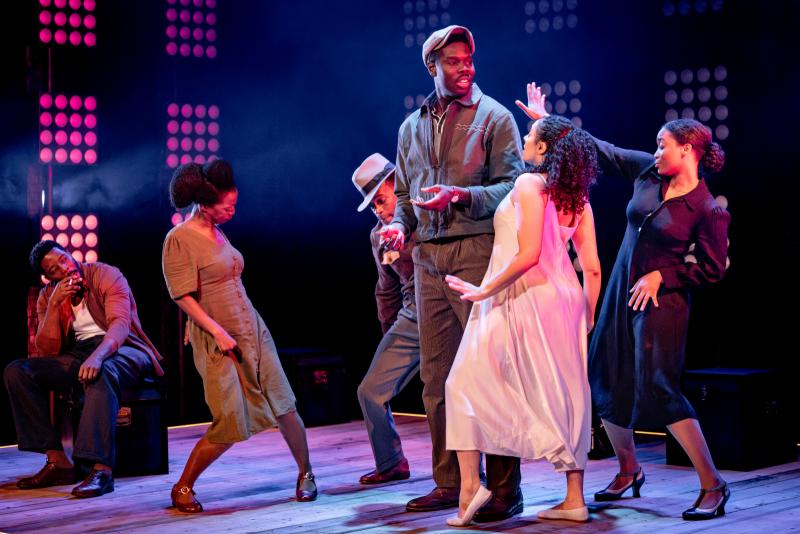The Lonely Londoners, Kiln Theatre review - Windrush Generation arrive in a London full of opportunities, but not for them | reviews, news & interviews
The Lonely Londoners, Kiln Theatre review - Windrush Generation arrive in a London full of opportunities, but not for them
The Lonely Londoners, Kiln Theatre review - Windrush Generation arrive in a London full of opportunities, but not for them
Memories, frustrations and hopes in a city emerging from post-war austerity

As something of an immigrant to the capital myself in the long hot summer of 1984, I gobbled up Absolute Beginners, Colin MacInnes’s novel of an outsider embracing the temptations and dangers of London.
Written a couple of years earlier and set a couple of miles east, Sam Selvon’s seminal book, The Lonely Londoners, focuses more specifically on Caribbean immigrants’ experience of a metropolis emerging from post-war austerity, of the cold, of the racism, of the possibilities always just out of reach.
Roy Williams’ adaptation of Selvon’s dazzling narrative was a big hit at the intimate Jermyn Street Theatre last year and comes to The Kiln (Kilburn being one of many London places namechecked in the script) with the challenge of preserving the tightness of the besieged community central to the play, now produced in a much larger space. Wisely, director Ebenezer Bamgboye, and designer, Laura Ann Price, dispense with anything beyond a few small black boxes on the larger black box stage, and a wall of neon bulbs, their harsh cold electric light contrasting with the much missed heat of the tropical sun.  Our lads (and their women) are as confined physically as they are socially, financially and psychologically by the hand they have been dealt. They are British subjects, invited to do work for the mother country, but with doors slammed in their faces by the 'No Irish, No Blacks, No Dogs' signs in landlords’ windows. Their fate is a day-to-day scrabble, the inevitable consequence of their insecurity of employment and, as we now know, their casual cruelty at the hands of The State, just getting started on its thoroughgoing dehumanising of The Windrush Generation.
Our lads (and their women) are as confined physically as they are socially, financially and psychologically by the hand they have been dealt. They are British subjects, invited to do work for the mother country, but with doors slammed in their faces by the 'No Irish, No Blacks, No Dogs' signs in landlords’ windows. Their fate is a day-to-day scrabble, the inevitable consequence of their insecurity of employment and, as we now know, their casual cruelty at the hands of The State, just getting started on its thoroughgoing dehumanising of The Windrush Generation.
Not that it’s all doom and gloom. Selvon’s key decision to retain the patois of the islands is retained by Williams, whose script bounces with wit as much as it sinks with weariness. ‘Tings’ take a little getting used to, but not much, and, in a play like this (For Black Boys… being the most obvious comparator in staging and themes), authenticity is critical. The excellent running joke of the upwardly mobile, feisty and very bright Agnes (Shannon Hayes, super in an underwritten role) giving elocution lessons to her funny mother-in-law, Tanty (Carol Moses), works so well because we can hear as well as see the stakes for both women shaping their vowels to integrate better. Agnes may have the looks and, soon, the accent to open doors, but it's her ballsiness that will see her through.
The heart of the play is located in the relationships between the four lads who have to navigate an alien culture. Solomon Israel lends charisma and pathos to Moses, the fixer cum philosopher-king, whose motivation to assume the role of the father these lads so desperately need becomes clear as the play progresses. It’s also a reminder that the immigrant’s roots in the homeland can never be simply disinterred and carried across an ocean – some part of them will always be there. And that’s right and proper.
Because Moses has the most to offer (were he born a generation later and white, or perhaps black or brown, he’d be a lawyer – and maybe Foreign Secretary or Mayor of London one day) he feels the stab of frustration most keenly, wavering on taking a short cut out of providing homely therapy, writing gnomic letters and chasing the white women in The Park, lured by a big, illegal, payday. Ultimately, he’s too entranced by what London might just do for him to try it and backs himself to make it on the level.
Not so Big City, the hustler who wants to get rich quick from promoting dances in church halls, but can’t get them off the ground. Gilbert Kyem Jnr lives all the way up to his character’s name and, starting as a wide-eyed naïf, descends into carrying a gun for a couple of white gangsters, before understanding that Moses’s assessment of the intelligence of the hold-up guys was right and laughing as much as his own incompetence as at theirs. He’s going to be okay.
So too Romario Shepherd’s smartmouth kid, Galahad, knocked back by his beating for being out and about squiring a white girl, but his confidence is iron-clad and his revenge will be in leaving the thugs behind once he finds his place and makes the money anyone with his attitude will always make in London. Lewis is his counterpoint, Tobi Bakare peeling back the layers of anger, pride and humiliation as Agnes’s husband’s neurosis displaces his disgust with himself, curdling into violence against her. You do see the man who arrived full of hope, but you also see how swiftly it erodes, and why.
The cast is rounded out by Aimée Powell’s ghostly presence, an avatar for the lives left behind, her singing beautiful, her movement suggesting the ephemeral fragility of memory. In a near two hour, all-through runtime, she provides much needed visual contrast in an ethereal white shift dress set against Anett Black’s wonderfully observed costumes for everyone else.
The Lonely Londoners captures a generation now almost all gone whose children, one hopes, had a less difficult time finding their place in a society still too hostile and too fearful of The Other, a label, a concept, that weighed so heavily on the shoulders of the 1950s Caribbean immigrants. It is important that those children, now approaching old age themselves, see that story told beautifully on the London stage – and it’s even more important that the rest of us, with our different roots, see it too.
rating
Explore topics
Share this article
The future of Arts Journalism
You can stop theartsdesk.com closing!
We urgently need financing to survive. Our fundraising drive has thus far raised £49,000 but we need to reach £100,000 or we will be forced to close. Please contribute here: https://gofund.me/c3f6033d
And if you can forward this information to anyone who might assist, we’d be grateful.

Subscribe to theartsdesk.com
Thank you for continuing to read our work on theartsdesk.com. For unlimited access to every article in its entirety, including our archive of more than 15,000 pieces, we're asking for £5 per month or £40 per year. We feel it's a very good deal, and hope you do too.
To take a subscription now simply click here.
And if you're looking for that extra gift for a friend or family member, why not treat them to a theartsdesk.com gift subscription?
more Theatre
 Mary Page Marlowe, Old Vic review - a starry portrait of a splintered life
Tracy Letts's Off Broadway play makes a shimmeringly powerful London debut
Mary Page Marlowe, Old Vic review - a starry portrait of a splintered life
Tracy Letts's Off Broadway play makes a shimmeringly powerful London debut
 Little Brother, Soho Theatre review - light, bright but emotionally true
This Verity Bargate Award-winning dramedy is entertaining as well as thought provoking
Little Brother, Soho Theatre review - light, bright but emotionally true
This Verity Bargate Award-winning dramedy is entertaining as well as thought provoking
 The Unbelievers, Royal Court Theatre - grimly compelling, powerfully performed
Nick Payne's new play is amongst his best
The Unbelievers, Royal Court Theatre - grimly compelling, powerfully performed
Nick Payne's new play is amongst his best
 The Maids, Donmar Warehouse review - vibrant cast lost in a spectacular-looking fever dream
Kip Williams revises Genet, with little gained in the update except eye-popping visuals
The Maids, Donmar Warehouse review - vibrant cast lost in a spectacular-looking fever dream
Kip Williams revises Genet, with little gained in the update except eye-popping visuals
 Ragdoll, Jermyn Street Theatre review - compelling and emotionally truthful
Katherine Moar returns with a Patty Hearst-inspired follow up to her debut hit 'Farm Hall'
Ragdoll, Jermyn Street Theatre review - compelling and emotionally truthful
Katherine Moar returns with a Patty Hearst-inspired follow up to her debut hit 'Farm Hall'
 Troilus and Cressida, Globe Theatre review - a 'problem play' with added problems
Raucous and carnivalesque, but also ugly and incomprehensible
Troilus and Cressida, Globe Theatre review - a 'problem play' with added problems
Raucous and carnivalesque, but also ugly and incomprehensible
 Clarkston, Trafalgar Theatre review - two lads on a road to nowhere
Netflix star, Joe Locke, is the selling point of a production that needs one
Clarkston, Trafalgar Theatre review - two lads on a road to nowhere
Netflix star, Joe Locke, is the selling point of a production that needs one
 Ghost Stories, Peacock Theatre review - spirited staging but short on scares
Impressive spectacle saves an ageing show in an unsuitable venue
Ghost Stories, Peacock Theatre review - spirited staging but short on scares
Impressive spectacle saves an ageing show in an unsuitable venue
 Hamlet, National Theatre review - turning tragedy to comedy is no joke
Hiran Abeyeskera’s childlike prince falls flat in a mixed production
Hamlet, National Theatre review - turning tragedy to comedy is no joke
Hiran Abeyeskera’s childlike prince falls flat in a mixed production
 Rohtko, Barbican review - postmodern meditation on fake and authentic art is less than the sum of its parts
Łukasz Twarkowski's production dazzles without illuminating
Rohtko, Barbican review - postmodern meditation on fake and authentic art is less than the sum of its parts
Łukasz Twarkowski's production dazzles without illuminating
 Lee, Park Theatre review - Lee Krasner looks back on her life as an artist
Informative and interesting, the play's format limits its potential
Lee, Park Theatre review - Lee Krasner looks back on her life as an artist
Informative and interesting, the play's format limits its potential
 Measure for Measure, RSC, Stratford review - 'problem play' has no problem with relevance
Shakespeare, in this adaptation, is at his most perceptive
Measure for Measure, RSC, Stratford review - 'problem play' has no problem with relevance
Shakespeare, in this adaptation, is at his most perceptive

Add comment